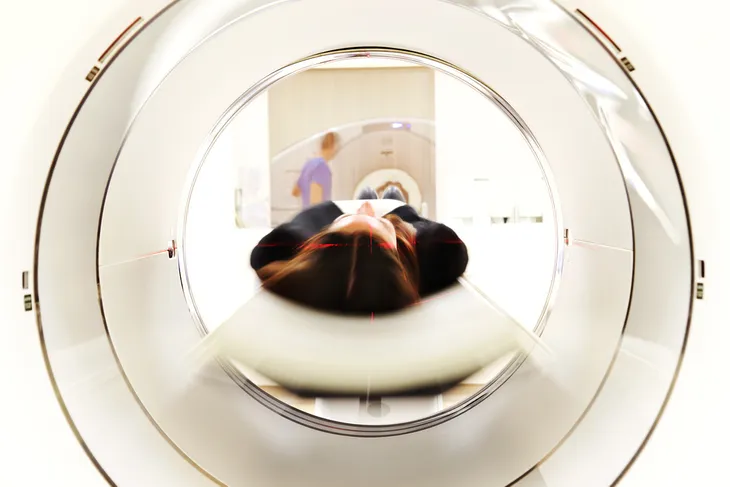Preparing for any medical test can be anxiety-provoking, especially when it’s your first time experiencing it. Not knowing what to expect during the procedure, plus the uncertainty of the result, is a lot to think about. You should first know that a magnetic resonance imaging (MRI) scan is a non-invasive medical procedure. It’s an important imaging technique that allows your doctor to examine your organs, tissues, and skeletal system and is used to help diagnose many different medical conditions. Understanding how to prepare for what you can expect before can help ease your mind.
What Is an MRI?
As its name suggests, a magnetic resonance imaging (MRI) scan is an imaging test that uses radio waves and powerful magnets to take a scan of the inside of your body. These images provide your doctor with detailed information without having to perform an invasive procedure.
MRIs are often ordered to help your doctor diagnose a medical condition. There are other ways to see the inside of your body such as computed tomography (CT) scan or an X-ray, but the benefits of an MRI are that you won’t be exposed to ionizing radiation and the images are much more detailed than an x-ray or CT.
Why Is It Done?
In short, MRIs are performed to examine your organs, tissue, and skeletal system. The scan provides your doctor with high-resolution images of the inside of your body. An MRI is most often used to examine the brain and spinal cord to help diagnose a stroke, tumors, multiple sclerosis, aneurysms, spinal cord disorders, and a brain injury from trauma. But that’s not all.
An MRI is also often used to take images of the heart and blood vessels to find out if there are blockages or inflammation in the blood vessels, structural issues in the aorta, and more. MRI scans can also help take images of other internal organs to look for tumors or other abnormalities and it is also used to take images of your bones and joints.
How to Prepare
If your doctor schedules an MRI for you, take a deep breath and don’t panic. The good news is preparing for an MRI is fairly simple. And you can find comfort in knowing the process is completely painless and non-invasive. The only thing you’ll have to do is stay still during the procedure.
Nonetheless, it’s always good to get informed about the process and know what to expect. Let’s take a look at a few ways you can prepare.
Inform Your Doctor of Your Medical History
The first step in preparing for an MRI is to be upfront and honest with your doctor. Inform them of your medical history because some conditions may require a few modifications to the procedure.
The scan is essentially a giant magnet which can pose some problems especially if you have metal implants. Things like a pacemaker, implanted drug infusion devices, and cochlear implants may cause some problems. But rest assured, your doctor will run through an extensive list of conditions to ensure it’s safe to perform the MRI.
If You’re Claustrophobic, Inform Your Doctor
If you don’t know already, during an MRI you are placed inside an enclosed tube-shaped machine. The duration of the scan will vary from person to person but in some cases, it can last up to an hour. While this is no problem for some people, those who are claustrophobic may feel very uncomfortable.
If you are claustrophobic or are concerned about being in the machine, be sure to inform your doctor. Your doctor may be able to help calm your nerves or provide you with medication to help keep you calm during the procedure.
Leave Jewelry at Home
Since the MRI machine is basically a giant magnet, you cannot wear any metal. Therefore the tech will ask you to remove any metal on your body, including jewelry.
If you normally wear valuable or sentimental pieces be sure to leave them at home. This will help reduce the risk of losing those important items.
What to Avoid Before an MRI
Ahead of your MRI, there are a few things to note that you should avoid doing. As mentioned, you’ll have to remove any metal before the scan, including jewelry. With this in mind, don’t get any new piercings before your scan. You’ll be asked to remove the jewelry which is a problem for new piercings that haven’t healed yet.
Next, your doctor may prescribe some lifestyle changes ahead of your scan such as avoiding certain foods, changes to your exercise levels, taking certain medications, etc. Be sure to follow their instructions to help your MRI go well and to help produce the best results.
Finally, if your doctor doesn’t prescribe any changes, it’s important that you maintain a normal schedule before the scan such as continuing to take your medications and participating in your normal daily activities. This will help provide more accurate results.
What to Expect Before the MRI
Now that you know what to avoid and a few steps to help you prepare, it’s time to look at what you can expect before the scan. Your doctor will likely instruct you to arrive at least 30-minutes before the exam. This will give you plenty of time to check in with the receptionist and complete the MRI screening form.
Once you’re checked in, you’ll be asked to change into a hospital gown, and a locker or secure place is typically provided to securely store your belongings. From there, the MRI tech will verify the requested exam and your ID.
In some cases, MRI contrast dye is needed. This is an agent that is used to help improve the visibility of internal body structures. If you require the contrast dye, an IV catheter will be inserted into your arm by the tech or a nurse.
What to Expect During the MRI
Once you’ve been prepped for the scan, you’ll be brought to the MRI machine. The machine looks like a long metal tube with a table that slides out from inside. The table is where you lay and it will slide back into the tube where the scan will take place. If you’re feeling nervous, don’t be embarrassed. It’s common to feel uneasy, especially when it’s your first time but you can do it and you will make it through!
During the scan, you’ll have to lie very still. That said the tech may ask you to perform small movements or ask you simple questions but wait for their instructions. It’s also worth noting, MRI machines are noisy. Typical sounds are pulsing and loud thumping noises. Don’t be alarmed, this is normal. If you think this may alarm you, you can ask your tech if they can provide a pair of headphones ahead of the procedure to decrease the noise.
Tips for Getting Through an MRI Scan
The best way to get through an MRI scan is to relax as much as possible. Mentally prepare ahead of the scan. Take deep breaths, and let your mind drift to positive thoughts during your scan. Before you know it, it will be over and you’ll have successfully made it through!
However, if you ever feel discomfort or distress during the scan, be sure to communicate that with the MRI tech. While you’re inside the machine, the tech can still hear you, and it’s important that you voice your concerns if they arise.
What to Expect After an MRI
Once your MRI is over, take a deep breath and congratulate yourself on getting through this new experience! This event that you have been stressing over is finally finished. Let’s take a look at what you can expect after an MRI scan.
For starters, if you’re claustrophobic and your doctor gave you any medication or sedatives before the MRI, it’s not safe for you to drive home. It’s imperative that you arrange for someone else to drive you home after the procedure. It’s also recommended to have someone drive you home anyway, whether you had a sedative or not.
Although rare, allergic reactions to contrast dye can happen. So if you require this dye for your MRI be on the lookout for signs of an allergic reaction such as hives, itchiness, rash, or shortness of breath. If you develop any of these symptom,s contact your doctor right away and if the symptoms are severe get to the emergency room ASAP.
Are There Any Risks?
Even though an MRI is a non-invasive procedure, there are a few potential risks worth mentioning. As mentioned, since the machine is a giant magnet, metal objects may be attracted to the machine. Metal can also still distort the image.
Jewelry isn’t the only cause for concern. Metallic joint prostheses, pacemakers, metal pins, screws, plates, stents, or surgical staples, artificial heart valves, implanted drug infusion pumps or nerve stimulators could all interfere with the machine. Even tattoo ink may interfere as darker ink colors sometimes contain metal.
Further, if you’re pregnant, you may require an alternative exam because the effects of the magnetic fields on the fetus are not completely understood. If you’re breastfeeding, you should also inform your doctor, especially if you need to receive the contrast dye.
Finally, if you have any liver or kidney problems, it’s important that you inform the MRI tech because “problems with these organs might limit the use of injected contrast agents during your scan,” says the Mayo Clinic.















